This Autumn saw the release of ex-Stranglers frontman, Hugh Cornwell, release his tenth solo album. Along with the ten Stranglers albums he appeared on between 1974 and 1990 and various other projects, it’s an illustrious career that spans in excess of twenty albums. While the band he left in 1990 decided to continue without him, Hugh ploughed a furrow for his own solo career that has flourished and has seen him repeatedly tour both in the UK and around the world. While many fans come to hear to original voice of The Stranglers revisit and reinterpret the band’s rich back catalogue, Hugh’s solo material should not be overshadowed by his past glories. In recent years, 2012’s ‘Totem and Taboo’ and ‘Monster’ from 2018 have shown he’s still very much got the ear for a good tune and an eye for a clever and observational lyric. Current album ‘Moments of Madness’ further ups his solo canon with ten well-crafted songs that, amongst other things, tackle the themes of ageing, tattoos and the throwaway society we live in. Pennyblackmusic caught up for a chat with Hugh about the album and how it came into being, the joys of touring and reminisce of when he was in the band that gave us ‘Golden Brown’ and so many other fantastic tunes. PB: So, how's things in the Cornwell camp at the moment? Hugh Cornwell: Yeah, pretty hectic. Lots of rehearsals going on because of the tour, you know. We're throwing in some brand-new Stranglers songs. Old brand-new Stranglers songs. And so we're throwing in some of those. But also in my set three quarters of that is new stuff. Stuff we haven't played before on tour. So there's a lot of preparation and also there’s going to be all-singing-and-dancing lights. So that's all got to be programmed. Then there's all this talking to people like you! And various other things. I haven't even got time to be sick! PB: And it's a pretty significant milestone; ten Stranglers albums and ten solo albums. HC: Someone brought my attention to that. Yeah, I always count ‘Nosferatu’ in the solo ones and the CCW one. I always count those in there and passed ten at ‘Totem and Taboo’, but I guess, strictly speaking, with just my name on it, I guess that’s right. PB: And the other thing that really struck me is you playing every instrument on the record. I know you started your musical career playing bass, but did you play the drums as well? HC: No, I don't actually play drums, but my engineer is a multi-faceted individual and he’s a multi-instrumentalist and can play more or less anything. And he's very good on drums. So subsequently when he gets in engineering mode, he's very good with drums and programming. So I had the concepts for the drum parts that I thought would work because the drums are the most important element of a record, I think, and I'll explain why in a little bit. So when I had a rough idea of the drum parts that I wanted he'd say “Oh, well, you can't do that”, and I would say “Why not?”. He said “Well, because the drummer wouldn’t be doing that as he’d have to split his hands to play both those things at the same time. So I’d said “Okay, well show me what's close to that?” And he showed me and I’d go “Well, OK, then let's hit that”. So it was an organic process of bringing about these drum parts. And it became even more clear to me now than ever before. I think when I first got exposed to Captain Beefheart drum drumming patterns, I realised how important they could be to a song. And with one song on the record, it took three attempts at the drum track to make it work. The first two didn't work at all and it took about six months to get it all worked out. We kept going back to it, going “Well, let me try this. I really want to make this song work, but the drums don't work”. So we stripped it down and started again. And we did it three times before we finally got the one that worked. And there you go. It made a song out of something that didn't deserve to be a song before. PB: That must be really satisfying as an artist when that happens? HC: Yeah, it's very satisfying. PB: So I've got a copy of 2008’s ‘Monster’ LP and I really loved it. But the world's changed quite a lot in the last the last four years, since then. Was ‘Moments of Madness’ conceived under Covid 19? HC: Well, yeah. I mean, we started work on one of the tracks before it hit in the Autumn of 2019, didn't finish the song off and then we had to go on tour and then picked it up when lockdown happened. So yeah, it was all done under that cloud cover. PB: Lyrics have always been really important to you and you've always written on really topical and interesting things, so I guess you’ve had a lot of subjects to write about over the last four years? HC: Well, some of the lyrics are based on specific private instances in my private life that have happened to me. But I always write those in code, you know, if I can, to protect my privacy. And some whimsical ideas, some philosophical ideas and even one about musing about tattoos. There was plenty of time to think about it. Yeah, that was my artistic space was lockdown. Some people really thrived. I think the creative people loved it, secretly. I can't complain about the two years that I spent because luckily nothing untoward happened to anybody that I was fond of, family, etc. I didn't lose anybody to it that I was close to and I only got it a few months ago, which is really weird. I had a really watered-down version of it. So I can't really say it was a terrible time for me, you know? PB: I don't know if this is my subconsciousness, or just me reading into it, but I think the album's very spacious. There's lots of space on the arrangements. HC: Well, I'm glad you noticed that. It was someth0ing I learned from ‘Monster’ and I've been slowly paring down the amount of stuff that's recorded and getting down to the basics. I remember working with Laurie Latham (on The Stranglers ‘Aural Sculpture’ LP) once and he'd record on every possible space on the two-inch tape back when we used analogue tape. Before digital, we used electronic magnetic tape - two inches wide and there were 24 tracks. And so you’d have a track sheet and you’d write in the boxes what was recorded: “Hi-hat here, snare here, guitar here” etc, etc. And then sometimes somebody would have an idea for an overdub, like “Let’s put some handclaps in that section”. You'd look at the sheet where there was space, in a place where one of the instruments wasn’t playing. And so Laurie is looking at this track sheet and it was getting more and more filled up. And I said “When are we finished recording this?” and he said “When I filled up all the time” and I said “Well, that's no good because you probably won't use it. And he said “Exactly, because when I come to mix it, I'll start taking things out. And if I take something out and it loses something, I'll put it back in. If I take something out and it doesn't lose anything, I'll leave it out.” And so he was stripping it back to see what the real basics he could get away with. And I learned something. What I do, instead of going through that route of recording all that stuff, taking so long, I try and map out as little as possible, before I've even started recording. There’s only three instruments so it's quite easy. So I go “Well, there's going to be a bass part and there's going to be a drum part and there's going to be a guitar part and then maybe some backing vocals. And that's it. It's so much easier when you don't have extra stuff like brass sections or keyboards or all sorts of other instruments. And sometimes you’ll go “This would be nice with a calliope on”. Something special. But then you've got the space to feature it. Sometimes you put a special instrument or something on and there’s so much on it, people go, “Well, I can't even hear it.” It's the old adage ‘less is more’. It’s a real cliche, but it is true. PB: I read the press release and it refers to The Doors and Lou Reed and I hear both of those inspirations. There's a really nice mixture of influences over the ten tracks. HC: Well, I can't deny that they are influences and stuff that I like. The stuff I listen to that affected me and influenced me. And when you're creative and you're trying to create something of your own, you want to create something that emulates something that you like. I wouldn't want to be writing a song like the Bay City Rollers because I'm not a Bay City Rollers fan. I'm going to try and write something that I would like, so I'll end up having a flavour of those people you mentioned and a variety of other people too. And you can't get away from that. It's sort of plagiarism but in a very weird way. You start off with that in mind, but then by the end of the recording process, you've gone through such a process that there's less to remind you of those original things in the end than there was at the beginning. PB: Plagiarism sort of morphs into inspiration, doesn't it? HC: Yeah. Inspiragiarism. PB: I think you’ve just invented a new word, Hugh! So, let’s move onto the album itself. The opening track ‘Coming Out of the Wilderness’ is a muscular start and I’m getting a bit a Duane Eddy twang there. I guess the wilderness you were coming out of was Covid possibly? HC: A lot of people talk about escaping the town to go into the country. But during Covid, for me, it was the other way around because I'm a Londoner and I spend a lot of time in London. But during the pandemic it was closed for business. There was nothing going on so there was no point in being in London. And I had the good fortune to be able to go into the country where my studio is. So I could decamp down there. And then I got cabin-fever and I was glad to get out of it when the city opened up again. So it was the opposite of what people normally do, coming out of the wilderness, back into the city. PB: And then next it's ‘Red Rose’. I think that's probably my favourite track. And the first few bars really remind me of a Pulp song, which is no bad thing, being in Sheffield. It really struck a chord with me because I was mulling over this craze for tattoos the other day. In the old days, it was only sailors and rock stars that had tattoos. Now everyone has tattoos and it's almost cooler not to have a tattoo. HC: Originally it was “I'm going to get a tattoo because I want’to be different”. But now if that was your reason, everyone, anywhere would laugh at you. So why are you different from anybody else by having a tattoo? It’s just ridiculous. PB: Have you got a tattoo? HC: No I don’t, and I never really want to. PB: Me neither. If someone said “Right, you've got to have a tattoo” I don't know what it would be. Probably Joy Division’s ‘Unknown Pleasures’ LP cover or a Stranglers logo, I guess. HC: Well, you're not going to fall out of love with Joy Division, are you? But you might fall out of love with a girlfriend, so you can't have a girlfriend’s name, or you could end up looking at her for the rest of your life. PB: Or you would only have to go out with girls with the same name. And that would be a bit limiting, right? HC: (Laughs) That’s a lovely concept! PB: For the next song we’re on to ‘I Wannahideinsideay’. HC: Yes. Everybody needs somewhere to go and hide away and feel comfortable and warm. PB: I really like this. Really lovely guitar work and a haunting melody. HC: That’s one of my favourites. PB: And were back round to this ‘dynamic’ thing as there's loads of space in there. I love the way you use that dynamic of silence. HC: Yeah, exactly. Every time you finish a record, you're enlightened. You sit back when it's done and the first things that come into your mind is what you learned from making it. And things that you think “That's interesting, that's something to be pursued”. So one of the things I slowly got to is this thing about space. And that sometimes the space is more important than putting something in it. I didn't have much chance to explore that when I was in The Stranglers because the keyboards filled up all the space. I'm not saying that in a denigratory way as sometimes it's good, but sometimes it’s bad. But there wasn't much space in Stranglers music because it was all filled up. It had so many things happening at the same time. In fact, some of the records sound like were playing a different tune. I think someone said that about some of the songs on ‘La Folie’. They said “I love it, but it sounds like you're playing a different song”. So there you go. I didn't have much chance to explore the value of brevity, I think the word is. So I'm discovering it now. And at the end of ‘Monster’, I started to find something and this thing about space. And so I wanted to develop it on this album, so I become more spatially aware of it. PB: I really like ‘When I Was a Young Man’ and the lyrics in particular. Are you reflecting on your relationship with your parents? HC: If you're going to write a song about when you're a young man, what are you going to think about? In my case, it's my mother and father because they're both dead and gone so I don't have them anymore and the only thing I can value is my memories. Good or bad. PB: What came across for me was that you seemed closer to your mother than your father. HC: Yeah, I didn't really have an understanding with my dad. I was a complete disappointment to him because I didn't want to be a doctor and I became a doctor of sound and he didn't like that at all. It wouldn't have been so bad if I had been a classical musician or Dixieland musician, because he was into that. But being rock, no. It did not compute with him, so he never really came to terms with that. PB: And the other thing I picked up from there was saying you wouldn't want to be young again. The Seventies were very different times to be young compared to the current times, weren’t they? HC: Yeah, I'm it must be so difficult now. I can't imagine being a young singer-songwriter, like myself, who plays guitar and sings, trying to come out of nowhere and find an audience. You've got to be very, very lucky and get some breaks to break through, because of the internet and there being so many people out there peddling their stuff. Back then, there wasn't as many people, but then the lines of communication were lower and there were less lines of communication. PB: Instead of everyone being in your face from everywhere, it was almost like you had a kind of local monopoly, I guess. HC: Yeah, yeah. But it must be impossible. I've got sympathy for those trying to make it now. What do you do? Try and be controversial? Everything's been done, really. And you can't make a joke of anything now because you'll upset somebody. So what can you do? It's sad and I'm so glad I'm not in that position. PB: So back to the album. We’re now on to the lead track, ‘Moments of Madness’, which makes complete sense. Punk and reggae have always had this sort of crossover and I thought that really worked really well. HC: With The Stranglers we did sort of ‘pseudo’ reggae, with ‘Peaches’ and ‘Nice and Sleazy’, but we never actually did an out-and-out reggae song. We probably thought we were a bit beneath it and that we couldn't do real reggae. So we just did ‘pseudo’ reggae. Do you see what I mean? PB: Yeah, it was a slightly different beat too, wasn't it? HC: Yeah, so we had elements of the reggae vibe, but this was my stab at an actual out-and-out reggae track and I'm quite pleased with it. PB: Yeah, for me, it really works. HC: I couldn’t see any point in not doing it. PBM: On to the next song, and I really like ‘Beware of the Doll’. Is that your tribute to the Velvet Underground’s ‘Femme Fatale’? HC: (Laughs) Yeah. I was walking past a terrace of houses in the countryside and a sort of homemade sign said “Beware of the dog” on it. And I took a photograph of it and I started looking at it and thought “Well, if you change the G and to double L, you've got a great song title”. So that's what happened. PB: And I think I ‘Too Much Trash’ is pretty is pretty straightforward and about your pet hate of people who litter. I'm with you all the way on that one. HC: Oh yeah. I don’t know if you have noticed, but the latest if you've noticed but the latest gem of genius, and I hope you put this in your article, is that the latest thing dog owners have come up with now is to take a plastic bag with them when they take their hound out. And they pick up the hound’s shit, put it in the plastic bag, tie a knot in it and then they leave it there. What's the point of even doing that? You’re better off just leaving the dog to shit and leaving it. They think by wrapping it in a plastic bag, that's better. I mean, talk about being idiots. There's no excuse for it. I'm probably being very un-PC by calling them idiots, but they are idiots to think that that's better. PB: The thing that really, really irks me is when people go to McDonald's, get a takeaway and then just throw everything out the car where they’re parked. HC: That's what you see in the countryside, you know. You get everything; McDonald's, cigarette packs and Costa cups, whatever. I don't know how you can police it. You can't really. I saw a great sign by the side of the road the other day which said, “Don't be a tosser” and it had a crumpled can on it. Great sign and play on words. PB: That takes us on to my laugh out loud moment on the album and the song ‘Lasagne’. HC: Well, the lasagne came before the song. This is a real-life story down in dear old, Mexico. There's an Italian couple and the wife makes the most magical lasagne me and a lot of my friends have ever tasted, anywhere on the planet. It's fantastic. And it's obviously her mother's recipe from Bologna. And I've been eating it regularly for nearly ten years. Before lockdown, when I was with them, I said, “I'm going to write a song about your lasagne” and they laughed. They didn't they didn't think I'd do it and thought it was a that joke. And then, when it was done, I sent them a link and they absolutely flipped out. We've got a real lovely little animation film to go with that which will be released at some stage next year. PB: When you go to an Italian restaurant, you can always judge how good they are by the lasagne. It's like a standard dish that you can really scope them out on. Next song up we’re on to the epic ‘Heartbreak at Seven’, which I presume is break-up song and it happened at 7 O’clock? HC: Yeah. You got it. PB: It’s really bluesy and reminds me of The Doors. Nice way to finish the album off. HC: Well, it’s funny that it ended up becoming the last track, because it was the first musical idea I worked on for the album. And I wasn't quite happy with how it was working. So I put it aside and then we came back to it once we'd got a few others done. I went back and reopened it and then was able to get a handle on it then. PB: Earlier you referred to some of the songs are quite private subjects and that you've written then in code. I'm guessing this is one of them. HC: Yeah, of course. But at least I got a song out of it! PB: So for me, overall, a great album and a great way to celebrate ten solo albums. HC: Well, I'm glad that it's a good one rather than a mediocre one. It wouldn't have been a good celebration if it had been mediocre. PB: To be honest, the last three albums have been really good. ‘Totem and Taboo’ was excellent. ‘Monster’ was excellent. So, you are on that upward trajectory and it gets harder, doesn't it? HC: Yeah. Well, the good thing is that I know I'm doing okay now because I learnt a lot working with Steve Albini (on ‘Totem and Taboo’). He's all about brevity. The first day of the recording was me, the bass player and drummer and Steve sitting down and working out if we could actually record all the songs with the ideas that we had by recording all the songs on a 16-track, because he had a two-inch 16-track machine. That means instead of having 24 tracks, if you only got 16, you've got more space for each track. You see what I mean? He said it will make a big difference to the way it sounds if we can get it on the 16 rather than rather than on 24. But on the first day, we didn’t do any recording and we just went through all the songs and we finally worked out that we could actually get it all on the 16. And it did make a difference. PB: ‘Stuck in Daily Mail Land’ is on that album, isn't it? HC: Yes, that's right. And it’s coming out of the vault for the tour. PB: I really love that song so I’ll will look forward to that. Which leads us nicely on to the live dates. You've recently played quite an extensive tour with The Undertones. HC: Yeah. And in fact we're playing this weekend with them in Blackpool. PBM: I saw them in the Devil's Arse on Friday, near Castleton and they were fantastic. HC: Yeah, they're great. They're genuine and they still love doing it and they're very nice to us and everyone's smiling, it's great. PB: And I guess it was one of those double-headed tours where everyone who loved The Undertones liked you and everybody who loved you, liked The Undertones. HC: Well, that would be an ideal situation, but I'm sure it's not totally like that. But it ticks both boxes for a lot of people. PB: So you've got 23 dates coming up in November and December. That's a pretty gruelling schedule. HC: Yeah, but I think that's better than some of the tours that I see being advertised now. If you look closely, there's some of these tours with the same number of dates spread over six months. They've got two in one month, and then nothing for four weeks and then two more and another one two weeks later. PB: For me, they're not really proper tours. HC: But that's how they're being billed. And it must be a nightmare to do that. I'd rather do them ‘Bang, bang, bang’ like we've got. We were lucky to get it like that because there’s such a backlog from those two years of Covid of shows that haven't been performed that it's hard to get a decent run like we got, and we did it because we did it well in advance. PB: Do you still really like going on the road? HC: Well, I don't mind doing the shows. It's when you've got to travel a long way between the shows. Travel is not free time. It's very tiring, even if you're doing nothing or if you're sleeping or whatever you're doing, it's very tiring. And so I like it when the travel is either cut down or there’s time to recover after the travelling with a free day or something. The last week starts in Carlisle and we're southerners, so we've got to get up to Carlisle, do the first show and then we’ve got to go up to Aberdeen after that, which is almost the same distance, the next day. So the last week is actually the toughest week. So I'm glad it's the last week, not the first week. PB: Just you before you go on stage, do you still get that buzz? HC: What buzz? (Laughs) PB: That sort of natural buzz rather than a chemically induced buzz. HC: You get a buzz when you're excited. And when you're excited is when you feel prepared. The worst thing is to be looking to go about doing something and you're lacking preparation. It's nice before you start if you have dotted all the i’s and crossed all the t’s. I don't think there's anything worse than going “Shit! Where's my spare battery?”. When you can say “We've covered everything”, then you can indulge yourself with the buzz. See what I mean? And it's all down to that, really. It's down to the Six P’s Principle, which was in ‘The Dirty Dozen’. Proper planning prevents piss-poor performance. PB: I’m just doing the maths and I think you’ve been at it for 48 years now. HC: Is that right? PB: It was 1974 when The Stranglers started right? HC: But I was playing music ten years before that. PB: Sorry, scratch that question then! You’ve past your fifty years mark. Have you thought about retirement? Most people retire when they’re 67, but for pop stars and musicians, it’s a bit different, isn’t it? Have you got a plan? Are you going to keep doing it until you can't or you stop enjoying it? HC: I don’t know. Maybe this will be the last tour. Who knows? I'll take it one day at a time. Why make plans when we've got Putin making plans for us. If Putin’s making plans for us, there is no point in making your own plans. PB: They might be cut abruptly short, right? HC: Yeah, You might as well just concentrate on one day at a time. PB: I promised myself I wouldn't talk about The Stranglers and just talk about your album but… HC: I don't mind talking about The Stranglers! PB: OK, well, just looking back, The Stranglers changed my life when I was a kid. The first ever single I bought was ‘Peaches’ and it was the start of a journey where I became absolutely obsessed with The Stranglers. HC: What was the B-side? PB: ‘Go Buddy Go’ as the AA side. HC: That’s right. We’d go on ‘Top of the Pops’ and do one one week and the other one the other week. Yeah. PB: You must look back at it as an extraordinary time and that you were in an extraordinary band. HC: Yeah, and it lasted quite a long time, until I left in 1990. So it lasted 16 years. We were lucky to last that long, I think. PB: What was your what was your favourite album out of the ten? HC: Oh, ‘Men in Black’. Just artistically. I don't care about how many records got sold. That's all rubbish. It’s down to what do you feel, what you're most comfortable with and what you feel you achieved. I think that we were all at the top of our game when we made ‘Men in Black’ and it comes through. Burnell was top of his game. Greenfield was flying high. Jet was amazingly receptive to new ideas and really invented with my help, the first electronic drum kit. And I was feeling pretty good. It was a great concept, very inspiring, and I think there are some moments on that record which are sheer poetry. And I don’t think we surpassed it. I don't care how many people bought copies of it. It’s not the point. The point is the vibe that was created and the moments on that, which are just fabulous. A lot of people were involved in making it, we had about eight engineers because we were recording all over the place. PB: As a band, you were really you're in sync with the concept and that comes across. HC: That was a very important aspect of it. We were totally in sync. That's right. PB: Obviously Dave Greenfield, very sadly, has now passed away, but have you seen JJ or Jet at all? HC: No. Not for 25 years, maybe. Jet came to one of my gigs, but he wouldn't come inside. He came to one of my gigs to pick his wife up and he didn't want to come inside. And when I found out, I thought “Why didn’t he just park his car and come inside?” It was after the show and it wasn’t even when there were a lot of people around. I thought the least he could do is just park up and come in and say Hello, but he didn’t. That’s the lasting impression that I left! PB: If JJ rang you up and asked you to go for a pint, would you? HC: I'd say “Who's paying?” PB: OK. He says “OK, I'm paying”. HC: I'd say “Well, where have you been for the last twenty-five years? PBM: OK, so he says “Well, I'm sorry about that”. HC: I’d say “OK. Let me sit down to hear that. Can you repeat that, please? Did I hear the word sorry?” (laughs) PB: As a band, you were such a unit, weren't you? HC: It was great. I've got such good memories. And we created a fabulous catalogue which we all are indebted to, because it's helped us make a living. Them continuing and me and what I'm doing. None of them could deny the rewards from that early catalogue is what has funded what's come afterwards. There's no denying that and that will be there forever, regardless of what anyone says about what I've done since or what they've done since. That catalogue stands, you know. PB: And you’ve changed the life of so many fans and have many fans who still adore the band. HC: Is that good or bad? I don't know. PB: I'm thinking it's good. I'm one of those fans and your band changed my life. HC: Well, as long as it was for the better. PB: Very much for the better. Thank you.
Band Links:-
http://www.hughcornwell.comhttps://www.facebook.com/hughcornwellofficial
https://twitter.com/HughCornwell
Play in YouTube:-
Have a Listen:-
Picture Gallery:-
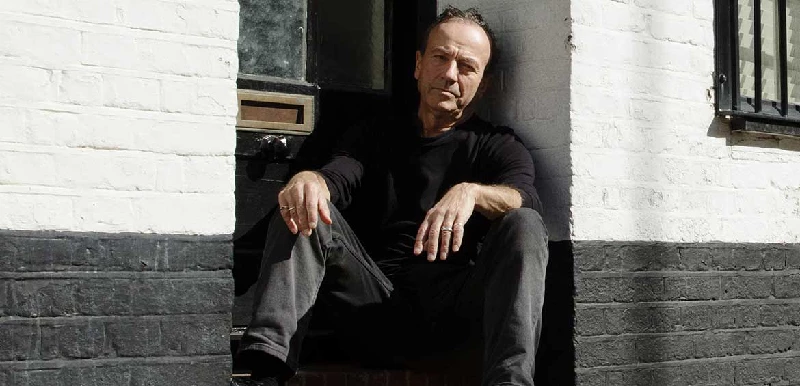
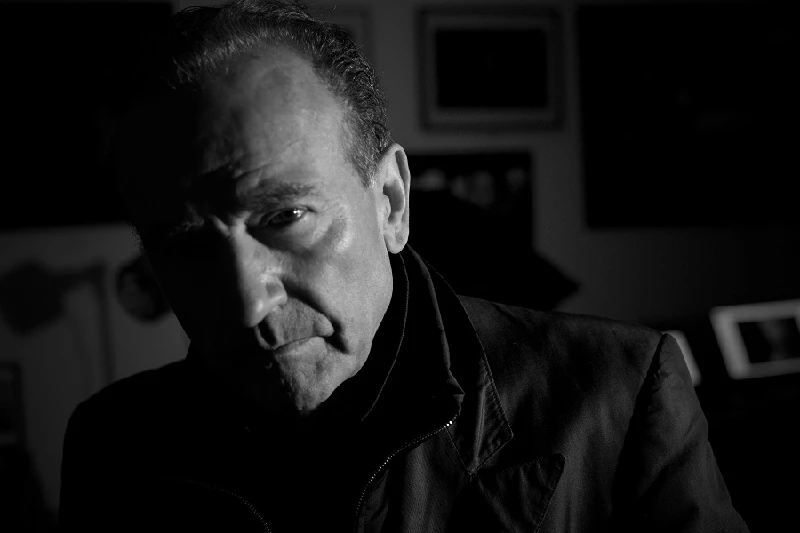
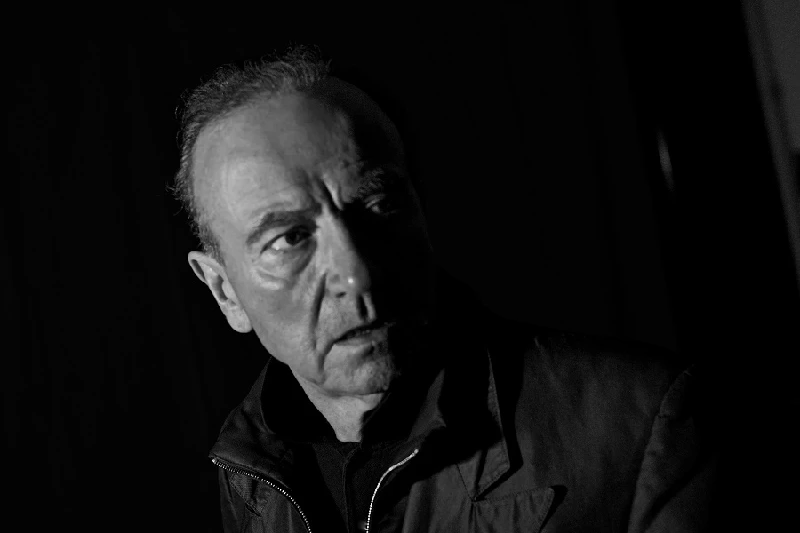
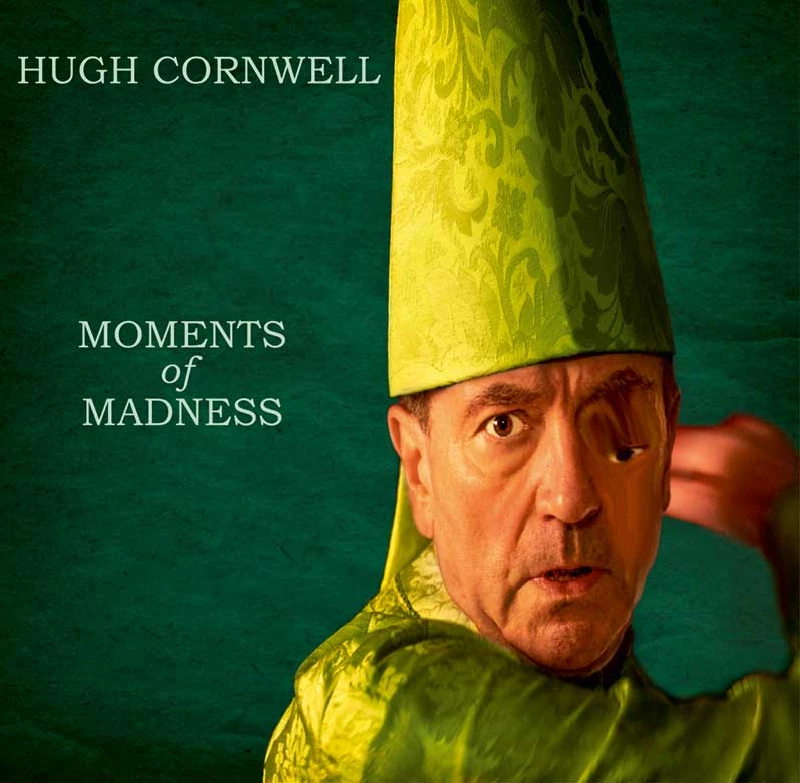
intro
With new LP ‘Moments of Madness’ in the racks, former Stranglers frontman Hugh Cornwell chats to Denzil Watson about the new album and his time with the legendary punk outfit
interviews |
|
Interview (2023) |
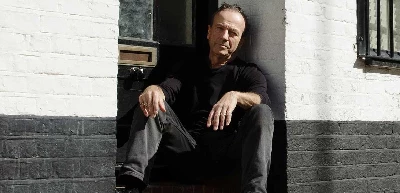
|
| Ex-Stranglers singer/guitarist Hugh Cornwell chats to Eoghan Lyng about his recent ‘Moments Of Madness’ LP and upcoming UK and Ireland shows. |
| Interview (2015) |
| Interview (2009) |
| Interview (2008) |
| Interview (2006) |
live reviews |
|
O2 Academy, Sheffield, 7/5/2023 |
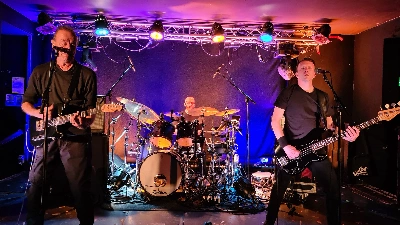
|
| On the road to support his recent ‘Moments Of Madness’ LP the former Stranglers frontman, long since turned solo artist Hugh Cornwell shows no sign of slowing down. |
| Academy 3, Manchester, 27/11/2009 |
photography |
|
Photoscapes (2022) |
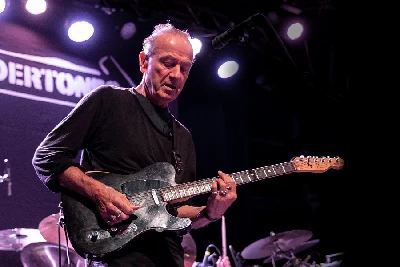
|
| Andrew Twambley takes photographs of former Stranglers frontman Hugh Cornwell at a gig at the Manchester Academy. |
soundcloud
most viewed articles
current edition
Carl Ewens - David Bowie 1964 to 1982 On Track: Every Album, Every SongArmory Show - Interview with Richard Jobson
John McKay - Interview
Colin Blunstone - Thalia Hall, Chicago, 16/7/2025
Bathers - Photoscapes 1
Billie Eilish - O2 Arena, London, 10/7/2025
Visor Fest - Valencia, Spain, 26/9/2025...27/9/2025
Loft - Interview
Sir Tim Rice - Interview
Robert Forster - Interview
previous editions
Manic Street Preachers - (Gig of a Lifetime) Millennium Stadium, Cardiff, December 1999Heavenly - P.U.N.K. Girl EP
Beautiful South - Ten Songs That Made Me Love...
Peter Perrett - In Dreams Begin Responsibilities Interview Part One
Boomtown Rats - Ten Songs That Made Me Love....
Oasis - Oasis, Earl's Court, London, 1995
Trudie Myerscough-Harris - Interview
Coldplay - Wembley Arena. London, 16/8/2022
Prolapse - Interview
Pixies - Ten Songs That Made Me Love...
most viewed reviews
current edition
Davey Woodward - Mumbo in the JumboSick Man of Europe - The Sick Man of Europe
Lucy Spraggan - Other Sides of the Moon
Phew, Erika Kobayashi,, Dieter Moebius - Radium Girls
Suzanne Vega - Flying With Angels
Bush - I Beat Loneliness
Amy Macdonald - Is This What You've Been Waiting For?
Alice Cooper - The Revenge of Alice Cooper
Blueboy - 2
Cynthia Erivo - I Forgive You
Pennyblackmusic Regular Contributors
Adrian Janes
Amanda J. Window
Andrew Twambley
Anthony Dhanendran
Benjamin Howarth
Cila Warncke
Daniel Cressey
Darren Aston
Dastardly
Dave Goodwin
Denzil Watson
Dominic B. Simpson
Eoghan Lyng
Fiona Hutchings
Harry Sherriff
Helen Tipping
Jamie Rowland
John Clarkson
Julie Cruickshank
Kimberly Bright
Lisa Torem
Maarten Schiethart